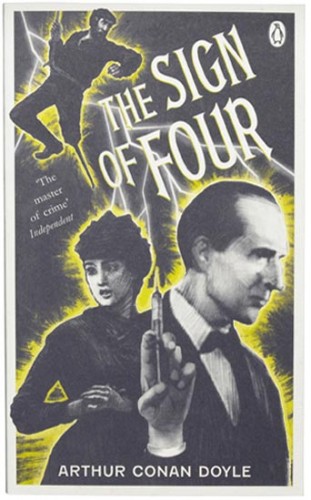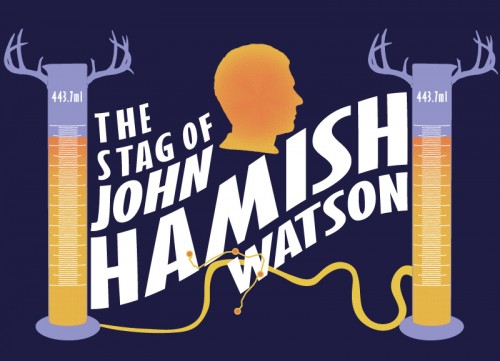
 After last week’s frenetic London chases, The Sign of Three opens with a scene of true, old-fashioned detective work, with a Lestrade, eighteen months thwarted, triumphant in at last making an arrest on a notorious bank gang. Sherlock texts him “HELP. PLEASE. NOW.”, and Lestrade cannot help but phone for maximum backup and forgo a major professional success. As he bursts into Sherlock’s study, his agitated body fills the entire doorway and camera shot – and then the angle switches to a Sherlock, recessed at his desk near the back of the room, hands on his temples, ensconced in his study.
After last week’s frenetic London chases, The Sign of Three opens with a scene of true, old-fashioned detective work, with a Lestrade, eighteen months thwarted, triumphant in at last making an arrest on a notorious bank gang. Sherlock texts him “HELP. PLEASE. NOW.”, and Lestrade cannot help but phone for maximum backup and forgo a major professional success. As he bursts into Sherlock’s study, his agitated body fills the entire doorway and camera shot – and then the angle switches to a Sherlock, recessed at his desk near the back of the room, hands on his temples, ensconced in his study.
As the camera moves a couple more times between the imposingly physical Lestrade and an awkwardly demure Sherlock, the contrast says a lot about the show, and especially this episode. Lestrade, operating within a traditional economy of force, cannot begin to comprehend that Sherlock’s need is a social obligation – a best-man toast for John – to which he feels entirely inadequate. For Sherlock, it’s a problem of thinking his way into the proper words, while Lestrade feels baffled by the urgency and his own role in it. Both characters, it seems, are out-of-place: a Lestrade who’s never quite able to comprehend the subtleties of Sherlock’s mind, but a Sherlock who is profoundly out-of-touch. Lestrade’s overly heavy-handed, room-filling presence and Sherlock’s quiet isolation try to comprehend each other.
It’s a fitting opening for this installment of series 3, in which the normal world of Watson’s wedding will run up against a murder plot, and Sherlock’s subtlety is the only thing which will be able to navigate the tension (unsurprisingly, he succeeds on the detective front; largely fails on the social one). After Sherlock’s demanding nature and self-absorption ruin Lestrade’s big arrest – and unnecessarily – we become alarmed that John’s wedding day will similarly thrown out-of-balance by our hero.
Within the detective story genre, weddings, along with other high-society events, are particularly salacious staging-grounds for crime drama. Everyone is assembled and things seem ordinary to most of the guests; in a classic case of dramatic irony we, the audience, soon learn there is murder afoot. Yet Gatiss and Moffat resist being conventional; the detective’s status as best man, and the investigation’s embedding in his speech, give the episode something of an emotional core. It’s messy, of course, and Sherlock’s disjointed, yet still-controlled-and-charmingly-clever expectoration mimics the screenplay’s demands: hang on through the absurdities, and everything will be pulled together in the end.
And it is. What starts as a toast so painful you’ll want to cover your eyes, with Sherlock’s characteristic egoism on high display, somehow resolves into a touching emotional moment. After last week’s superhero master-sleuth, the balance is corrected to inject the episode, in an impressively natural manner, with an emotional core. And as a quick grace take-away, Holmes’s numerous faults provide the basis for his praise of John, who continually bears with them. Critics have complained some about Holmes’s immunity to culpability in the show, but the need to make Holmes eccentric, egoistic, yet lovable reaches its strongest point with this excursus on the fact that Watson (the character most closely identified with the audience) accepts him. And a marriage dinner is, of course, not a bad stage at all for such acceptance to play out.
So thematically and structurally, Sunday’s episode was impressively tightly knit. In terms of the show’s overall balance, I couldn’t help but feel we were still given too high a dose of Holmes. Cleverness aside, I don’t think Moffat and Gatiss’s self-awareness of that problem – quite meta-ly expressed in Mrs. Hudson’s response to Sherlock, “I think you’re a popular choice [for murder] at the moment.” Sherlock’s rambling diversions do come together into saving the life of one of the dearest people in Watson’s life, of whom Holmes is even jealous, but that doesn’t mean his excessive stage presence receives the same tidy resolution.
One of the problems with Moriarty’s departure, as well as Holmes’s more collaborative relationship with Mycroft, is that he doesn’t have much competition. I can’t help but miss Holmes as a target, someone actively struggling, and at times being on the losing end, of his battles of wits. Sunday’s emotional task was a good challenge for Holmes, but he met it too adequately; he could use a bit less popularity, and the side-characters’ resentments of him could use strengthening.
Sherlock’s awe-inspiring intelligence risks getting a little stale. I still loved watching Sunday’s episode, but it’s unsurprising, at this point, that the show’s strongest moments were Sherlock’s humility during the toast, his praise of Watson, his smooth but ultimately timid moments with the bridesmaid, and his lonely departure at the end. Remarkable things happening unexpectedly from a self-absorbed and very fallible man, who’s well-liked and successful despite himself, is Sherlock’s strength. His weaknesses, not his technique, make the show work. We were given some of that Sunday, but Gatiss and Moffat could amplify that element of the series. We’ve been given both the spectacular Reichenbach survival and now the necessary rapprochement with Watson. Loose ends in the plot are tied and the emotional core with Watson has returned. Now we need someone, to paraphrase the late Moriarty, to make things interesting.
Thoughts that didn’t fit above:
-As Holmes accuses the photographer, there’s a montage of pictures from the even we’ve just watched in video. The Instagram and Facebook album reference here is one of the more clever parts of the show, juxtaposing the images of happiness at the reception with the faceless man behind them. You can’t help but feel that Sherlock is the outsider, too.
-The deduction that Mary is pregnant – before even John knew – is a sharp ending for the episode, but at some point, John’s marriage needs more independence from Sherlock to give Watson room to develop as his own character. Two years without his friend (, the Holy Saturday of Sherlock,) presumably gave John some independence, but we haven’t seen much of it onscreen.
-There’s a new villain next week, assuming the man behind the screens last week wasn’t a complete joke, and I’m looking forward to seeing how well he stands up to Sherlock. Next week, too, should have more space for plot, and to me at least, in this show that’s promising.

COMMENTS
2 responses to “On TV: Sherlock, “The Sign of Three””
Leave a Reply















Without giving anything away what happens in the third episode, I’ll say that you’re ability to anticipate themes/issues addressed in the end is pretty uncanny. Looking forward to your thoughts next week!
A further comment: there’s a great and gracious bit coming up in next week’s episode involving a USB jump stick. More good stuff to mine. In my opinion, the season is weak because it’s too eccentric in its humorous emphasis. The show is at its best when it’s more like Luther (Sherlock strikes me a Luther-lite), when it’s dark and less bound up in Holmes’ social eccentricity. Episode 3 is the strongest of the season for that reason, I think.